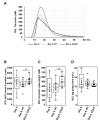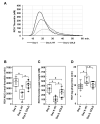Composition of plasma in apheresis-derived platelet concentrates under cold storage
- PMID: 35969131
- PMCID: PMC10335340
- DOI: 10.2450/2022.0057-22
Composition of plasma in apheresis-derived platelet concentrates under cold storage
Abstract
Background: Compared to room temperature (RT, 22-24°C) storage, refrigeration of platelet concentrates (PC) may provide advantages due to lower risks of bacterial growth and increased responsiveness of platelets. However, storage at cold temperature (CT, 2-6°C) may also strongly influence the plasmatic composition of PC. This study analysed the content of plasma in apheresis-derived platelet concentrates (APC).
Materials and methods: APC were stored under blood bank conditions at CT or RT. On days 0 and 6, samples were drawn for analysis. Coagulation parameters comprised global coagulation assays, single factors or inhibitors. The distribution pattern of von Willebrand multimers was investigated by immunoblotting. Thrombin generation was assessed with a fluorescence assay. Immunological and clinical chemistry parameters were determined on automated analysers.
Results: After storage at CT, coagulation factors V, VII, IX or protein S activity are partially reduced, but less compromised than under RT. There was a large reduction in Factor VIII levels and this was similar at both temperatures. In contrast to RT, von Willebrand Factor (vWF) activity was remarkably decreased at CT, and this was accompanied by the shift from high molecular to low molecular weight multimers. Thrombin generation showed improved preservation at CT. Other plasma proteins like immunoglobulins were stable at both conditions.
Discussion: Refrigeration mediates a bivalent effect on plasmatic coagulation in APC. At CT, the partial reduction of labile coagulation factors is less emphasised. However, CT does not prevent Factor VIII depletion, but induces an additional loss of vWF activity by multimer cleavage. Preserved thrombin generation may indicate a higher hemostatic capacity for cold storage.
Conflict of interest statement
The Authors declare no conflicts of interest.
Figures



References
MeSH terms
Substances
LinkOut - more resources
Full Text Sources
Miscellaneous
